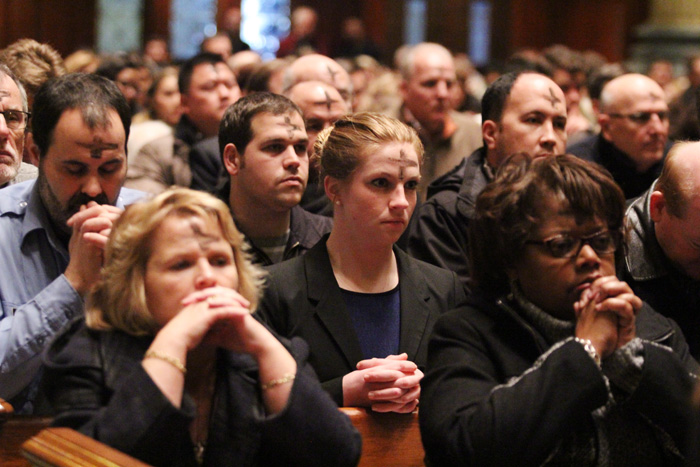
Catholics begin Lent with the sign of the cross on Ash Wednesday, Feb. 10, 2016 at the Cathedral Basilica of SS. Peter and Paul, Philadelphia. (Photo by Sarah Webb)
As they receive ashes and give up sweets, many Catholics risk missing the whole point of the Lenten season – either turning it into a self-improvement challenge, or looking for loopholes in the church’s requirements for fasting and abstinence.
Neither approach is correct, said Father Dennis Gill, director of the Archdiocese of Philadelphia’s Office for Divine Worship and rector of the Cathedral Basilica of SS. Peter and Paul.
“I think the problem behind the Lenten rut is that Catholics don’t understand what Lent is all about,” said Father Gill.
For one thing, he said, it’s not a personal quest.
[hotblock]
“Lent belongs to the whole church, which hears the invitation to repent and believe in the Gospel,” he said. “We each do our part as a member of the church, to help build it up by this corporate act of penance during Lent.”
The communal dimension of Lent was evident from its earliest days, said Father Gill.
“It has its origin with the unbaptized preparing for their baptism at the Easter Vigil,” he said.
As catechumens readied themselves to be received into the church, he said, “those who were already baptized would be inspired … to see how they may have put aside or tarnished their own baptism.”
Through personal penance and conversion, the baptized journeyed with catechumens to the Easter Vigil, where the former renewed their baptismal promises as new members embraced theirs for the first time.
Father Gill said that such solidarity can be recaptured “if we have an understanding that Lent is about each of us together reforming our lives and being about conversion, so that we would all enter into the Easter mysteries, ready for the new life given to us by Christ.”
[hotblock2]
One way to make Lent less lonely (and more on-target) is to share in specific disciplines such as fasting.
“In our own rectory, we decided among the four priests that on Wednesdays we’ll have an additional fast day,” said Father Gill.
Although one simple meal, two smaller ones and no snacks might seem insufficient for busy priests in the middle of their week, Father Gill said “there’s strength in doing it together.”
“We encourage each other; we recognize that we’re weak together, and we can become stronger together,” he said.
In general, fasting is also a practice that most Catholics could undertake with a bit more vigor and rigor, he said.
“We’ve gotten too soft about everything,” said Father Gill, pointing out that many faithful have interpreted the “minimal obligation” specified by the U.S. bishops as “the only obligation.”
Father Gill cited the paschal fast as an example. Often unfamiliar to Catholics, the paschal fast extends from Good Friday until the Easter Vigil in honor of Christ’s passion, enabling the faithful “to share more fully and celebrate more readily his resurrection,” according to the U.S. bishops.
The paschal fast marks a shift from penance to expectation, said Father Gill.
“It’s the origin of our Communion fast, which is the fast of preparing for divine food,” he said.
Almsgiving and prayer are equally central to Lenten preparation, and while a given individual’s Lenten journey may emphasize one discipline in particular, the key is to simply “keep Lent,” said Father Gill.
“It’s so easy to find ourselves in situations where we put Lent aside,” he said. “But we have a great opportunity to witness to others when we keep Lent with others and in the presence of others.”
A “Lent well spent” is one “where I have been unable to uncover deep within myself sinful defects … and present them to the mercy of the Lord,” said Father Gill.
After 40 diligent days, he added, the goal is to “arrive at the celebration of the Easter Triduum … ready to receive the Risen Lord and live from the Risen Lord in a more full and complete way as a Christian.”
PREVIOUS: Reconciling oneself to God leads to healing, pope says in Lenten message
NEXT: Ash Wednesday, my best birthday ever


Share this story